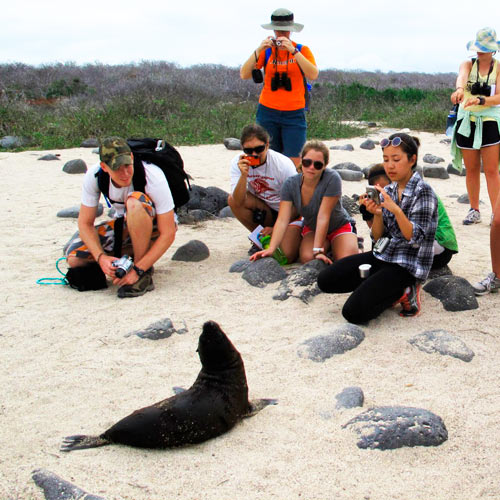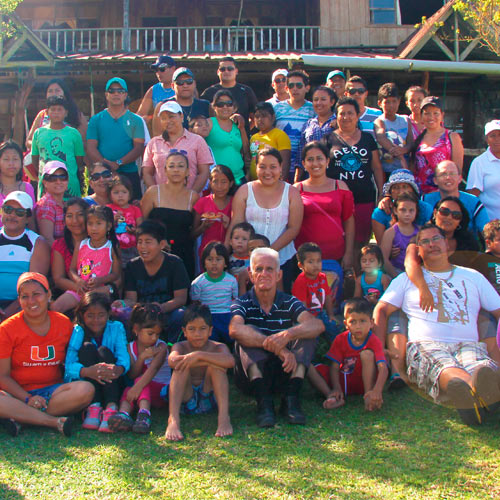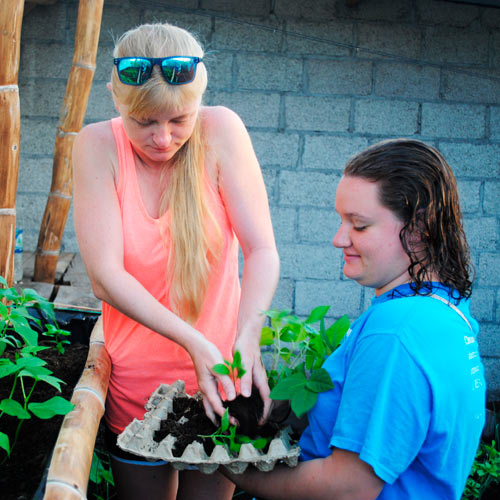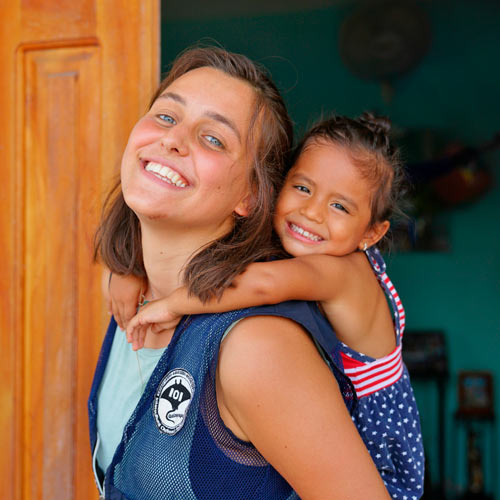Regenerative Agriculture For Food Security And Climate Change In Galapagos (Ecuador).
- Puerto Villamil, Isabela, Galapagos
- July 2024 – 2 to 3 weeks
- Language: Spanish and English
Galapagos
Individual Program
We also have available a 4-week individual program in Galápagos. Available year-round, this once-in-a-lifetime opportunity begins every first Monday of the month. Immerse yourself in the stunning beauty of the Galápagos while contributing to meaningful projects and initiatives. Explore the unique ecosystems, engage with local communities, and make a lasting impact.


Context
The Galapagos Islands have always been imbued with a profound ecological significance. From expansive, untouched shores to the presence of rare, endemic species, this archipelago, born of volcanic activity, straddles the equator in a remarkable display of biodiversity. Preserving the extraordinary beauty of this unique haven necessitates a concerted focus on conservation and education efforts that are deeply rooted in understanding and respecting its inhabitants.
Our local partners, IOI, are deeply committed to safeguarding the Galapagos extends beyond mere rhetoric. We actively collaborate with local authorities, the Galapagos National Park, educational institutions, and esteemed international nonprofits. Through these partnerships, we ensure that every endeavor is meticulously crafted to align with the social and environmental needs.
Our work is underpinned by a philosophy of collaboration and collective action. Together, we strive to protect and nurture the wild and captivating landscape of the Galapagos for the enduring benefit of present and future generations. Embrace the opportunity to make a meaningful difference in one of the world’s most precious ecological treasures – join us in the Galapagos and be part of this vital endeavor!
Learning Outcomes
1
Explore the wild and biodiverse Galapagos islands, learning how ecotourism can be implemented in a critical biodiversity hotspot.
2
Gain and develop critical thinking on key topics such as sustainability and the UN Sustainable Development Goals.
3
Develop key carbon literacy skills, and be part of developing a carbon neutral international education project.
4
Volunteer in a long term sustainable agriculture project aiming at increasing Isabela’s food sovereignty and decrease its carbon footprint.
5
Develop intercultural competences.
6
Gain critical leadership skills, and have the opportunity to apply them in real time and situations.
7
SULITEST TASK official assessment will be provided to all students
Program Structure
Induction and competency enhancement:
Throughout your program you will embark on a comprehensive introduction to our local partners and projects, delving into our enduring sustainability strategy and ongoing projects. This period will be instrumental in acquiring essential skills, ranging from leadership and management proficiency to volunteering, and understanding the operational intricacies of our projects along with logistics management. Our seasoned team will closely monitor your development, offering continuous feedback, including weekly sessions with your designated mentor.
Volunteering:
During your stay in Isabela you will be volunteering in a sustainable and regenerative agricultural project. The project comprises three interlinked goals: improve food security for and reduce carbon footprint of life in Galapagos, protect the environment and restore degraded lands, and increase socio-economic benefits to the community. They will engage in a variety of activities within regenerative agriculture farms, as well as participate in microenterprises within the sector.
Carbon literacy workshop:
As an organization, we are working to maximally reduce our emissions in line with latest climate science. Rather than simply offsetting by “paying” for our pollution and continuing business as usual, we are balancing remaining residual emissions through carbon removal credits and “in-setting”—mitigating internally as an organization. As part of this strategy, all participants will participate in a carbon literacy workshop, providing the latest data on climate science as well as share how to measure carbon emissions and strategies to reduce them, in Galapagos but also in our daily lives.
Weekly mentorship:
Our staff is here to support your development and contribution to our conservation efforts. Every week you will sit down with your assigned mentor to evaluate your development, set weekly objectives, and reflect on your progress.
Develop your soft skills:
We know that it’s not all about your academic and technical skills. Employers and educational institutions are looking for well-rounded, adaptable, and resourceful individuals. Our internships will help you gain and develop skills that will enhance your future employability and continuing education opportunities.
Knowledge transfer:
Your internship will be led by our experienced professionals, directly communicating their real world experience to you.
Leadership training:
We want you to be as autonomous and skilled as possible. Leadership is one of the most sought-after skills for potential employers. You will receive our leadership training course and have ample opportunities to put these skills into practice.
Cultural activities:
Weekends are reserved for relaxation and fun while exploring the island of Isabela. Hike the 2nd largest caldera (type of volcano) in the world or snorkel in moon-like ocean landscapes.


Acquired Skills
Technical and academic skills
- To understand regenerative agricultural techniques used to address issues related to food security and climate change.
Intercultural competence
- Competencies to work and interact with different cultures.
- Expand self -knowledge by recognizing strengths and weaknesses.
Systemic Analysis
- To understand the world as a system; the interrelationships,
dependencies and North-South effects. - To develop the ability to establish the connections and subsequent
alliances necessary to create innovative projects.
Sustainability and impact measurement
- To understand the capacity for action on the 2030 Agenda.
- To develop indicators to measure impact from an economic, social
economical and sustainable value.
Innovation in sustainable companies
- To increase the innovative capacity to find solutions to social, economic and sustainable problems.
Expected Results
1
Train the next generation of leaders for the creation and management of social and sustainable companies.
2
Train students to implement their own solutions with a social focus and a global vision on a local scale. So that they understand the functioning of successful alliances at these levels and to encourage their capacity for innovation in the face of this great challenge at all levels.
3
Equip students with the necessary skills to identify and solve sustainability problems in an ethical way; and empower them to develop an entrepreneurial spirit in this field based on critical, responsible, committed and creative thinking.
4
Development of indicators to measure the social and environmental impact of their actions.
5
Deep understanding of the Sustainable Development Goals and the 2030 Agenda and their transversal application.
